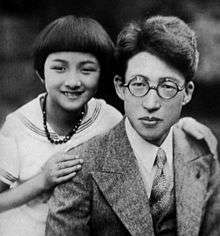Hideko Takamine
| Hideko Takamine | |
|---|---|
 Hideko Takamine | |
| Born |
March 27, 1924 Hakodate, Hokkaido, Japan |
| Died |
December 28, 2010 (aged 86) Tokyo, Japan |
| Cause of death | Lung cancer |
| Occupation | Actress |
| Years active | 1929–1979 |
| Spouse(s) | |
| Awards |
Japan Academy Prize Lifetime Achievement Award 1996 Mainichi Film Concours Best Actress 1962 Happiness of Us Alone 1958 Times of Joy and Sorrow 1956 Floating Clouds 1955 Twenty-Four Eyes |
Hideko Takamine (高峰 秀子 Takamine Hideko, March 27, 1924 – December 28, 2010) was a Japanese actress who began as a child actor and maintained her fame in a career that spanned half a century. She is particularly known for her collaborations with director Mikio Naruse.
Early life

Takamine was born in Hakodate, Hokkaidō in 1924. Her first role was in the Shochiku studio's 1929 film Mother (Haha), which brought her tremendous popularity as a child actor. Soon she was billed as Japan's Shirley Temple.
Career
After moving to the Toho studio in 1937, her dramatic roles in Kajirō Yamamoto's Tsuzurikata kyōshitsu and Uma brought her added fame as a girl star.[1] Some of her film appearances from the 1930s and 1940s were lost during the Second World War when Japan's film archives were damaged by bombing and fires.
In 1950, she made what was considered a very daring move by breaking with the Japanese studio system, leaving the Shin Toho Studio and becoming a much sought-after freelance actress. Her films with directors Keisuke Kinoshita and Mikio Naruse during the 1950s and early 1960s made her Japan's top star. Her performance as a dedicated small town teacher observing her students' lives over several decades in Kinoshita's The Twenty-four Eyes (1954) is credited with that film's tremendous success and enduring popularity in Japan. Another powerful performance was as a tenant farmer's daughter in the 1961 film Immortal Love.
Takamine was especially favored by director Mikio Naruse, starring in a dozen of his films and portraying strong-willed, hardworking women struggling in poverty or lowly positions, and often held down by the traditional family system. Some examples include her roles as the tragic, love-struck heroine in Floating Clouds (1955) and an aging Ginza bar hostess desperate to escape her circumstances in When a Woman Ascends the Stairs (1960).
Personal life
She married director-writer Zenzo Matsuyama in 1955, but set a precedent by choosing not to give up her acting career. She made many of her most memorable films in the 1960s and retired from making movies in 1979.
After retiring as an actress, she published her autobiography and several essay collections.[2]
Death
She died of lung cancer on 28 December 2010 at the age of 86.[1]
Filmography

From left to right, Tokihiko Okada, Hideo Sugawara and Hideko

(incomplete)
- Tokyo Chorus (1931)
- Hideko the Bus-Conductor (1941)
- Horse (1941)
- Ahen senso (1943)
- Those Who Make Tomorrow (1946)
- Ginza Kankan Musume (1949)
- The Munekata Sisters (Munekata kyōdai) (1950)
- Carmen Comes Home (1951)
- Lightning (1952)
- Entotsu no mieru basho (1953)
- The Wild Geese (1953)
- Twenty-four Eyes (1954)
- Floating Clouds (1955)
- Nagareru (1956)
- A Wife's Heart (1956)
- Untamed (1957)
- Yorokobi mo kanashimi mo ikutoshitsuki aka The Lighthouse or Times of Joy and Sorrow or Years of Joy and Sorrow (1957)
- Rickshaw Man (1958)
- When a Woman Ascends the Stairs (1960)
- Daughters, Wives and a Mother (Musume Tsuma Haha) (1960)
- As a Wife, As a Woman (1961)
- Happiness of Us Alone (1961)
- The Human Condition: A Soldier's Prayer (1961)
- Immortal Love (1961)
- Burari Bura-bura Monogatari (1962)
- A Wanderer's Notebook (1962)
- A Woman's Life (Onna no rekishi) (1963)
- Yearning (1964)
References
- 1 2 "Actress Hideko Takamine dies at age 86". Los Angeles Times. 1 January 2011. Retrieved 21 March 2012.
- ↑ Kehr, Dave (3 January 2011). "Hideko Takamine, Lauded Japanese Actress, Dies at 86". New York Times. Retrieved 21 March 2012.
External links
| Wikimedia Commons has media related to Hideko Takamine. |
- Eiga Stars IV :: Hideko Takamine Eiga Stars: Portraits of Japanese Divas in Fan Magazines of the 1950s photo gallery
- University of Waterloo, Spring 1994 KINEMA profile
- San Francisco Chronicle, "Director Mikio Naruse retrospective takes insightful plunge into a postwar Japan in flux", December 28, 2005.
- Hideko Takamine on IMDb
- Hideko Takamine at the Japanese Movie Database (in Japanese)
- Obituary, Hideko Takamine, Lauded Japanese Actress, Dies at 86 at The New York Times